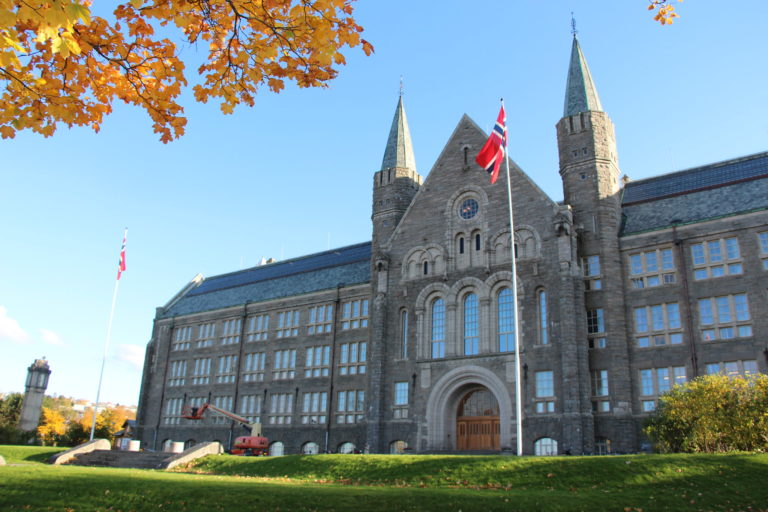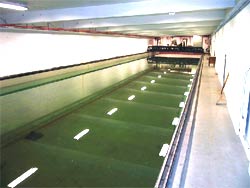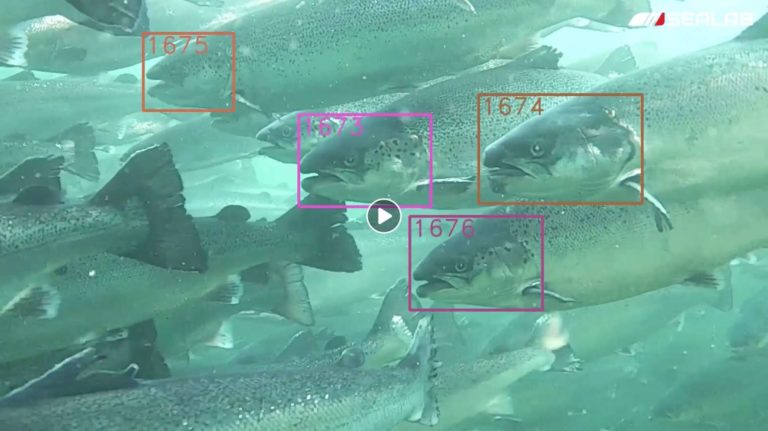
NTNU: Norwegian University of Science and Technology (Norway)
The Norwegian University of Science and Technology, NTNU, is the primary Norwegian university in engineering and technology. NTNU is, however, a full range university. More than 300 PhD degrees are awarded yearly, in the fields of technology, science, arts and humanities, social sciences and medicine. NTNU has a broad range of contacts with industry. The annual budget of NTNU is around € 750 million, 25% of which is externally funded. NTNU is an active participant in the EU Framework Program for Research and Innovation, Horizon2020, with more than 125 projects.
Participating in the MIR is the Department of Marine Technology which is part of the Faculty of Engineering at NTNU
Department of Marine Technology
The department has around 113 employees, including 24 professors and 33 researchers/associate professors. In addition, the department has around 90 PhD candidates. Annually, approximately 150 MSc candidates are graduated from the department through different MSc programs. In addition, 24 PhDs were awarded from the department in 2018.
The department of Marine Technology in collaboration with the department of Engineering Cybernetics, MARINTEK, SINTEF Fisheries and Aquaculture, SINTEC ICT, DNV GL and Equinor and leading international and national collaborators, were awarded a Centre of Excellence by the Research Council of Norway in 2013.
The centre is NTNU AMOS, centre of autonomous marine operations and system. The centre creates fundamental knowledge and innovations through multidisciplinary theoretical, numerical, and experimental research within the knowledge fields of hydrodynamics, structural mechanics, guidance, navigation, and control.
Department of Engineering Cybernetics and Department of Marine Technology
Two departments at NTNU are involved in the programme, namely Department of Engineering Cybernetics and Department of Marine Technology. The departments has specialized in mathematical methods and control theory which facilitate the assessment, development and sustainable operation of Norway´s biggest export industries – oil and gas extraction at sea, ship technology with corresponding equipment industry, fisheries and aquaculture technology – as well as newer developments including offshore renewable energy, coastal infrastructure and marine robotics for mapping and monitoring the ocean environment, including polar regions.
NTNU educates 80% of all engineers in Norway, and holds engineering tracks in building environment, energy and petroleum, minerals, manufacturing, oceans, information & communication technologies, and cybernetics. NTNU takes a multi-disciplinary approach and students learn to work across disciplines through projects such as Experts in teams. Big data and AI are key enabling technologies which are now changing the field of engineering and marine robotics. Competence is being developed in all areas of engineering on how to improve operations by use of digital solutions.
The teaching philosophy is research-based education. This is ensured by teaching personnel (professors) bringing latest research into the portfolio. All professors are required to perform research, publish results in open access as well as supervise several PhD candidates. This ensures an appropriate level of research in education. Also, all courses are required to have a digital component, provide digital exams and digital lecture solutions. This contributes to ensuring excellence in education.
For more information see https://www.ntnu.edu/core-tasks#education
The Marine Cybernetics Laboratory (MC-lab) is a laboratory located at the Department of Marine Technology, NTNU, in Trondheim. The laboratory consists of a control room and a towing tank with dimensions 40m × 6.46m× 1.5m and includes a wave maker, a towing carriage and a 6DOF real-time position system. The MC-lab is often used for experimental testing of DP (Dynamical positioning). The water tank is also used as the underwater laboratory environment. The laboratory is mainly used by Master students and PhD-candidates at the Department of Marine Technology.
AI is a key focus area at NTNU and holds the Norwegian Open Artificial Intelligence Lab as a research centre bringing together research, education and innovation within AI. The objectives of the AI Lab are to enable both basic and applied interdisciplinary research at high international level, and foster strong partnerships between academia, the private sector, public sector, and research institutes. We provide infrastructure and a framework for close cooperation with diverse partners.
NTNU has a dedicated International Office which provides guidance to all international fellows, both students and researchers.
In addition, Students will be enrolled in the local programs at NTNU, and as such they will be well embedded in the larger student and alumni communities. These communities are international as well, but with a higher share of national students. This will help to integrate them into the societies here in Trondheim, Norway.
Students will be offered student housing through the Student Welfare Association (SiT): The centralized international office arranges a welcome week for all students, and offers various forms of assistance to international students etc.:
Students will apply directly to the Directorate of Immigration (UDI) for a student residence permit, admitted students will receive information about that from the International Office.
MIR Local Coordinator
Prof. Martin Ludvigsen
E-mail: martin.ludvigsen@ntnu.no




